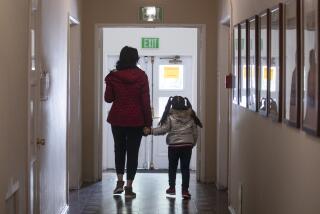Mentally Ill Women Find a Home Here
- Share via
Lucres Haque, 29, has been in and out of homeless shelters for the past five years, floating between family in New York and friends in San Diego.
“I lost my job and I didn’t have any place to stay, and I was getting poisoned by my family so I couldn’t leave,” Haque said. “Right now, I’m trying to get out of the shelter system.”
Haque has come to rest in Escondido, where the first shelter for mentally ill homeless women in North County opened two months ago. The six-bed shelter near the center of town is one of the largest of its kind in San Diego County, where there are only about 10 beds available for mentally ill homeless women.
“They have different degrees of problems, but they are not capable of managing their affairs in the long term without some type of support network,” said Bob Klug, food and shelter program manager for the North County Interfaith Council, which runs the shelter.
Klug, his wife and his two children live on the top floor of a split-level house; the bottom level is the shelter.
“People’s perception of a homeless shelter for mentally ill women . . . the first thing that flashes in their mind is something like a downtown Los Angeles soup kitchen,” Klug said.
“The reality is that it is a very peaceful environment. You don’t think that I’d put my wife and kids or myself in any jeopardy. This is a completely safe environment,” said Klug, who acknowledges that most of the neighbors do not know of the shelter’s existence.
The shelter is maintained by the women staying there, many of whom were abused by their husbands.
“I had to leave my kids with him because we would’ve ended up killing each other, or the county would’ve come and taken them away,” said Jennifer Bergren, 31.
Bergren has been at the shelter for two weeks. Her husband was abusive, she said, and had been arrested for drug use and possession several times.
She was brought to the shelter after overdosing on medication and being shifted among various North County shelters.
“It seems like I’m unhappy no matter what I’m doing. I’m very hopeless . . . and confused,” Bergren said.
Now, she says, she feels as though she’s getting back on her feet. She even started a waitressing job last week.
“They’ve been dejected and rejected for so long that they are just completely passive,” Klug said. “Once they get in here, they’re not moving back out onto the streets. That doesn’t help anybody.”
The shelter gives the women an opportunity to get back on their feet. Many are eligible for government social services but have not been taking advantage of them, Klug said. The women must leave the shelter during the day, and are not allowed back in until 5 p.m., a rule designed to prevent them from withdrawing completely from society.
Unlike at most shelters, there is no limit on how long the women can stay. The average has been about 25 days, Klug said.
Of the dozen women who have passed through the shelter in the past two months, only one is back on the streets, Klug said. The others are in permanent living situations.
The women are referred to the shelter by county mental health workers and must be drug- and alcohol-free, Klug said. Most of the referrals come from other shelters in the area or from hospitals.
“They have problems with people often taking advantage of them, stealing from them,” said Joanne Albus, a registered nurse with the mental health department who deals with the mentally ill homeless.
Most social service providers agree there is a dire need for more shelters for mentally ill homeless women, though no one seems to have a definite fix on the number of homeless people needing help.
Studies have shown that women make up about 28% of the homeless population in the county. While figures for the number of women who are homeless and mentally ill are unavailable, about a third of the entire homeless population in the county is mentally ill, said Karen Hendrickson, homeless services coordinator for the National Institute on Mental Health. The organization is conducting a study of mentally ill homeless in San Diego.
There are about 40 beds in the county for mentally ill homeless, but “for women exclusively there really is almost nothing available,” Hendrickson said.
More to Read
Sign up for Essential California
The most important California stories and recommendations in your inbox every morning.
You may occasionally receive promotional content from the Los Angeles Times.










